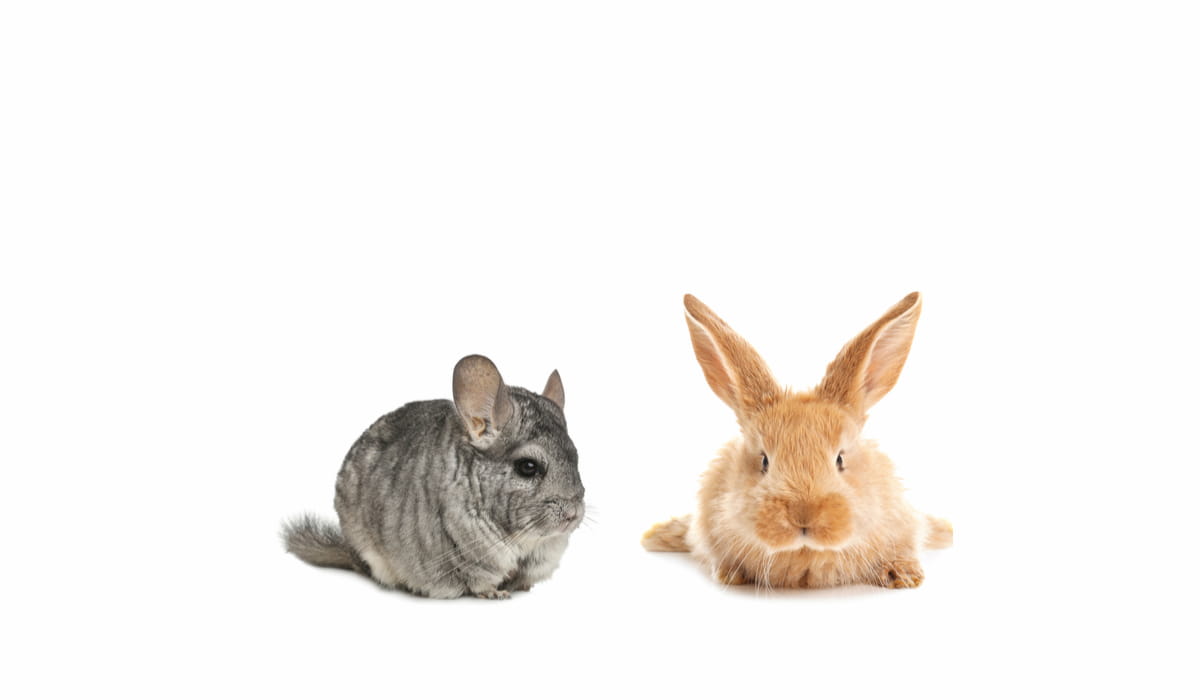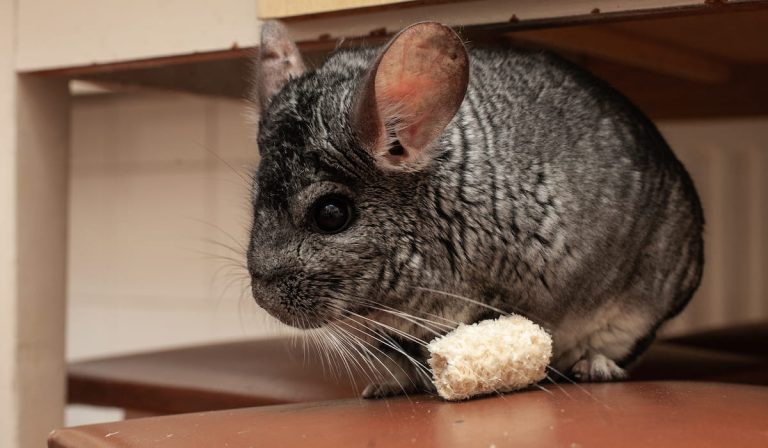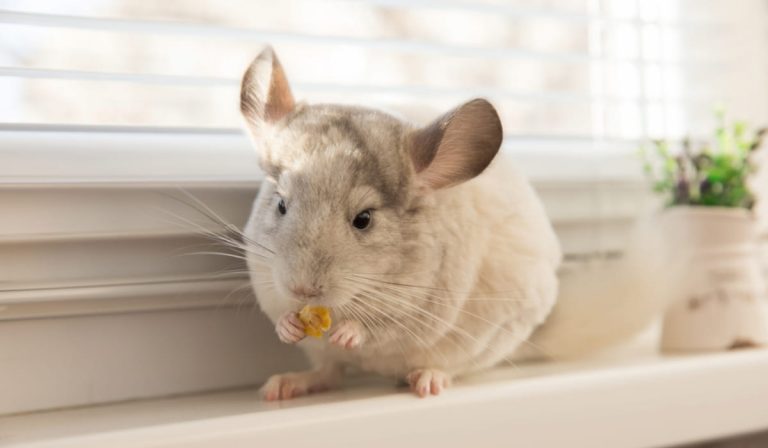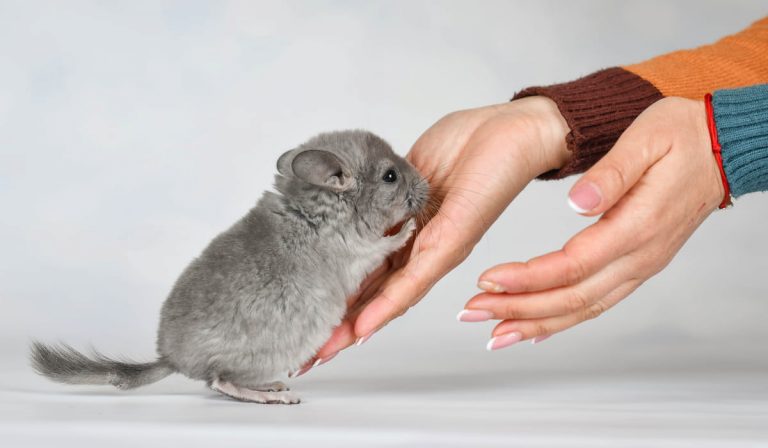Can Chinchillas and Rabbits Live Together?
Both chinchillas and rabbits are cute pets and the thought of having them both paints an even cuter picture. If you own one of them and are planning to adopt the other, it is important to consider if it is safe to house them together, among other factors, before taking the step.
So, can chinchillas and rabbits safely live together?
Chinchillas and rabbits cannot live together in the same cage but can share the same home. They share some similar traits and there is a potential that could become friends, though that is not guaranteed, but they have sharp differences that have to be addressed separately, and so they should therefore be housed separately.

At times, some owners might be tempted to cage them together, maybe for cuteness, or in a bid to save on some money, space, or to make the animals get along faster.
The story is theirs to tell but this is never a good idea for a number of reasons. Let’s find out.
Why Can’t Chinchillas and Rabbits be Roommates?
Chinchillas and rabbits are two different species that just happen to share some traits and can successfully get along.
Housing them together is not, however, good for the reasons below;
- Different grooming needs – Dust baths, for example, are a grooming routine for chinchillas. For rabbits, this can cause respiratory issues.
- Different diets – Chinchillas and rabbits do not share diets, but rather, each has its specific nutritional needs. They should, therefore, not have access to each other’s food and should never share.
- Specific housing requirements – Chinchillas are masterful climbers who require much space with lots of climbing levels for them to exercise in their cages, while rabbits only need enough space with several compartments to stretch out when resting.
- These two species also handle heat stress differently. Rabbits can live both indoors and outdoors while a chinchilla, despite the fact that it can withstand extremely cold temperatures, cannot tolerate heat or warm temperatures.
Temperatures above 80 degrees Fahrenheit can cause heatstroke, and can possibly kill it. It should therefore be kept indoors, in an air-conditioned room to avoid heat stress.
- Different traits – Though clever and sociable, chinchillas can be very aggressive and violent around other small animals and chinchillas, not to mention rabbits.
Housing them separately keeps the chinchilla from picking a fight with the rabbit because as fierce as they can be, they are very fragile. Rabbits can be cool and innocent but when provoked, they always have a killer kick that a fragile creature like a chinchilla can never handle on the receiving end. - Rabbit droppings naturally carry bacteria that could kill a chinchilla, and so should not be left sharing space without proper supervision.
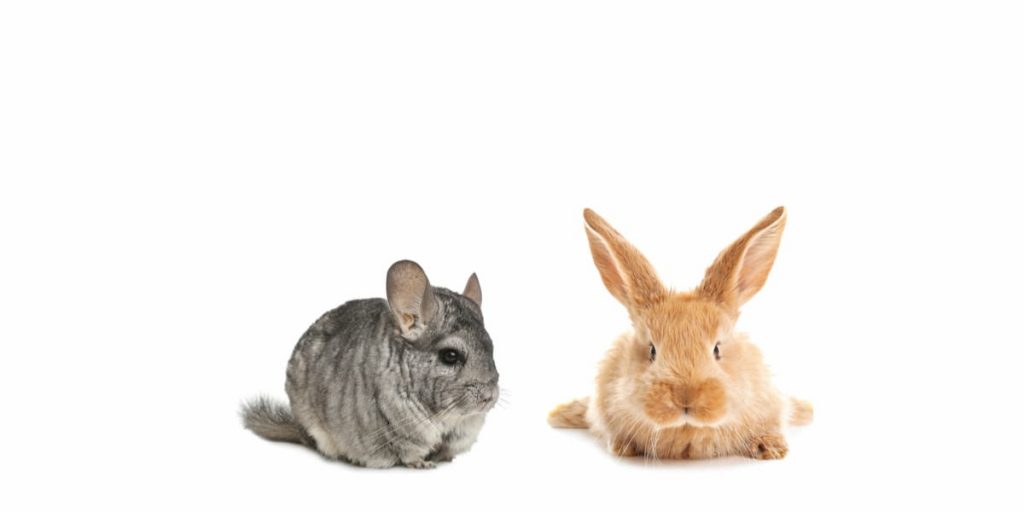
Common Traits between Chinchillas and Rabbits
Chinchillas and rabbits are adorable pets who despite being totally different, do share a few traits. First is their physical appearance. These two are known for exotic coats, which can be in a wide range of colors, thanks to selective breeding.
They also have big ears that function as part of their body language. They always keep their ears alert when angry or suspicious, and relax them back when being petted or in a good mood.
Their long and powerful hind limbs are also an adaptation for their running and jumping skills.
They also share their prey status in the wild, which greatly influences their personality and how they relate with other animals. They are always alert and caretakers by nature, and it may take a while to build trust and a good relationship with both the owners and other animals.
Once these animals trust you, they become extremely friendly and affectionate.
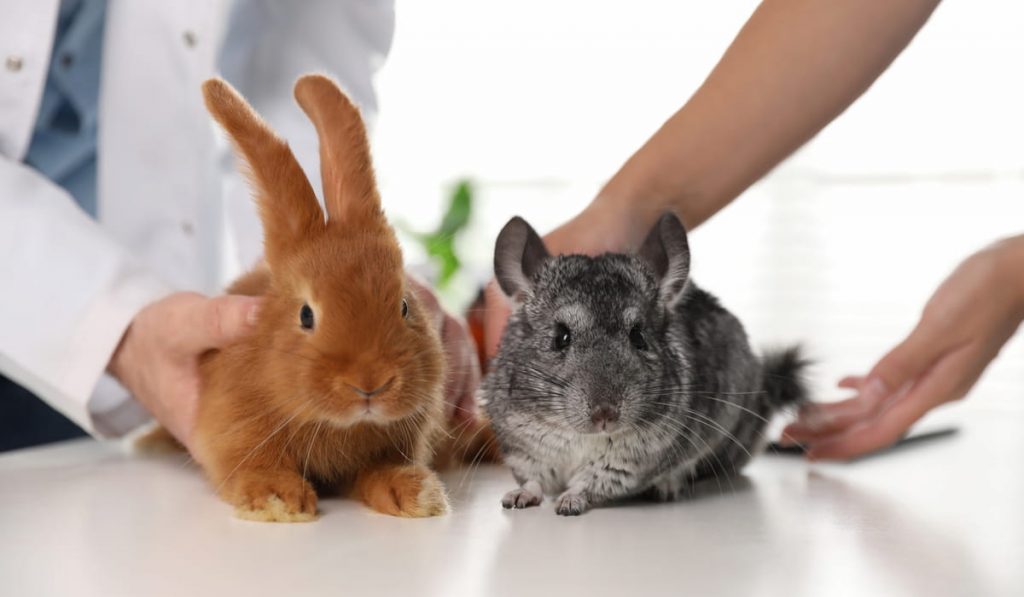
Do Chinchillas Get Along With Rabbits?
Chinchillas and rabbits can develop a friendship but it is a slow and gradual process with no guarantees.
To start off the bonding process, you may place their cages close to each other and closely monitor their reactions. If they are not violent, you can at times hold them on your lap or let their cages open so that they can escape and interact more if they want to.
You should, however, watch them closely and separate them if they seem uncomfortable or angered when around each other. Rabbits are larger than the average chinchilla and could easily hurt the chinchilla by accident.
Can Chinchillas and Rabbits Breed?
Chinchillas and rabbits are two different species with different genetic make-ups, and cannot breed.
This is a common concern mainly because of the chinchilla rabbits. for them, the ‘chinchilla’ is just a breed name, maybe because of their smooth and soft fur that resembles a chinchilla’s.
Despite the similarity, under no circumstances can the two breed.
Can Chinchillas and Rabbits Share Food?
You should never allow your chinchillas and rabbits to share food. You should rather keep them and let them eat in their respective cages, and never alone with the other’s food.
Although they basically have similar diets consisting of hay and pellets, these pets are two different breeds with different dietary requirements that should be addressed independently.

Can Chinchillas and Rabbits Eat Each Other’s Food?
Chinchillas cannot eat rabbit food because they have a sensitive digestive system with much of their digestion done in the gut. They therefore need and follow a strict diet mainly consisting of hay and maybe pellets, with occasional treats.
On the other hand, rabbits can safely eat chinchilla feeds but should be given in the right amounts. They digest food with their large intestine and cecum, with their diet mainly like that of chinchillas, but also love vegetables and leafy greens.
Each of them has pellets specific for each, with that of chinchillas having nutrients and needs in amounts specific to them, while the rabbits’ pellets are also specific to their needs.
Chinchillas should, however, be able to eat high-quality rabbit pellets in small portions. Not all rabbit pellets are good for them, and you should check the ingredients to determine if they are good for your chinchilla.
They should be able to share the same hay, but chinchillas are a little pickier about their hay. They should also be fed occasional fruits and vegetables as treats, but the rabbit will always eat more than the chinchilla.
It is fine to give treats and vegetables to your rabbits in large amounts, but for chinchillas, treats should be given in moderation. Overeating can cause serious digestive problems like bloating.
This doesn’t, however, mean that rabbits should be overfed the fruits and vegetables, but only that they can handle more than the chinchilla.
Chinchillas should not, therefore, have access to the rabbit’s food, because they will always eat as many snacks as they can find, and too much might be problematic for the little pet.

Can Chinchillas Live With Other Small Animals?
The only roommate a chinchilla can have is another chinchilla. They might be social and friendly, but do not prefer having cage-mates. Peaceful co-existence is, however, not guaranteed if they are not introduced in the correct manner.
Chinchillas could share some characteristics with other small animals like rats, rabbits, degu, ferrets, guinea pigs, and mice, but they are totally different and have different needs, behaviors, and personalities.
You should, therefore, never let a chinchilla share a cage with another animal, no matter how you deem it fit for them to live together.
The unmonitored company might result in violence, fights, and another animal not getting the nutrients that it needs.
Conclusion
Chinchillas and rabbits should not share the same cage.
It can be a little disappointing but you can’t house them with other preferred good pets because it is not safe and there are few chances of getting along.
Learning that it isn’t good for chinchillas to share cages should not hinder you from acquiring a rabbit or another pet.
It is easier to manage both if you know their specific requirements and needs, including how to care for them in their different spaces for them to thrive.
Resources
- https://chinchillacaregroup.com/can-chinchillas-and-rabbits-live-together/
- https://www.rspca.org.uk/adviceandwelfare/pets/rodents/chinchillas/diet
- https://rabbit.org/small-animal-nutrition/
- https://squeaksandnibbles.com/can-rabbits-and-chinchillas-live-together/
- https://www.rspca.org.uk/adviceandwelfare/pets/rodents/chinchillas/behaviour
- https://planetchinchilla.com/can-chinchillas-and-rabbits-live-together/

